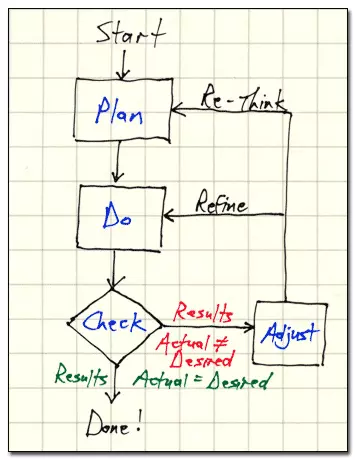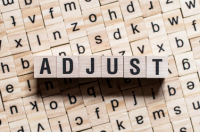You want to be successful, yet how will you go about reaching your goal?

A few years ago, we streamlined the way we produce our monthly marketing content, moving from a separate topic for each of the three items to a single monthly theme broad enough to yield three pieces focusing on different aspects of the same topic. This new approach has worked out well for everyone involved.
Which brings me to the theme my Manager of Business Development and I chose for this month’s marketing content – Failure. While thinking about ways I could present this topic, I realized how dramatically my views on failure – and even on the word “failure” – have changed over the past decade.
A New Lens
Our culture is heavily invested in keeping score. How much did the stock market gain or lose today? Who won yesterday's football game? Who are the top 10 most highly compensated CEO's in the area, the state, the nation? What are the top colleges? Who has momentum in political polls?
As I thought more about the first twenty-five years of my professional career, I realized I looked at my work performance through the lens of keeping score – Win – Lose, Succeed – Fail, Best – Middling. Whenever I didn't get the outcome I wanted, I would beat myself up for not being perfect or for not anticipating something that, in hindsight, was obvious.
Then, about fifteen years ago, I started to reconsider my work performance, moving solidly into a new way of assessing it – Stretch – Stuck, Action – Inertia, Innovation – Complacency. This change in mindset helped me avoid beating myself up for being human and let me view my performance in terms of constant improvement.
Interestingly, I believe I've finally hit my full stride in recent years, consistently churning out top performances for my clients and my associates.
Learning is a Process...
While writing this article, I revisited a doodle I did over a decade ago:

This doodle is heavy on taking action, and that's why most words in it are verbs.
What are the three most important verbs in the doodle? To me, they are Check and Adjust, and the implicit Repeat.
Leadership author, teacher, and speaker John Maxwell has a saying I like to quote – “Everyone has experiences – very few have evaluated experiences.” All people can Do and most people will Plan a bit before taking action. Yet, how many people routinely and rigorously perform the Check and Adjust steps?
Whether it's business, sports, school, or a hobby, this trial-and-error process is how we learn what works and what doesn't work. In fact, isn't this why we have managers, coaches, teachers, and instructors – to observe us and provide feedback on how we're doing so we can get better?
Paying attention to the details, seeking out ideas for improvement from a variety of people, reframing work as a series of experiments to see what works well and what doesn't – in any field, this mindset separates the top performers from the journeymen.
Practicing and honing our craft – whatever it is we do to earn a living – can be tedious, difficult, and boring, as I described in Beating the Ghost. “Beat The Ghost” is a basketball shooting drill requiring you to mix up shots and beat “The Ghost” – an imaginary opponent. People like Steph Curry make shooting look easy, yet he has undoubtedly spent tens of thousands of hours out of the spotlight and in a gym perfecting his various shots until he could “Beat the Ghost.”
...And Success is an Outcome of the Learning Process
There is no shortcut to becoming a shooter as good as Steph Curry. Everyone on the court in the NBA is a gifted player, yet Steph can outshoot every one of them.
While superstar athletes and coaches may not speak in terms of a Plan-Do-Check-Adjust-Repeat cycle, quotes from them show they think this way:
- Michael Jordan, Six NBA Championships – “I've missed more than 9,000 shots in my career. I've lost almost 300 games, and 26 times, I've been trusted to take the winning shot and missed. I've failed over and over again in my life. And that is why I succeed.”
- Wayne Gretzky, Four Stanley Cups – “You miss 100% of the shots you don’t take.”
- Phil Jackson, Eleven NBA Championships – “No one plays this game perfectly. It's the guy who recovers from his mistakes who wins.”
While the best practice sessions will come close to the physicality of a real game, playing the practice squad can’t duplicate the emotions, intensity, and level of play in a championship game. Jordan and Gretzky took a lot of shots in GAMES, and that's because they had taken even more shots in PRACTICE – their coaches encouraged this, and their teammates knew this and passed them the ball or puck to take the game-winning shot.
Becoming the Best Version of Ourselves
Elite athletes work hard to become the best versions of themselves – and so can we. Whatever you do, imagine ways you might do it better. Tweak a few things in your routine and observe the results. Better than your usual results? Great – start doing more of that! Not as good as your usual results? That's fine – now you know things to improve or drop. Keep at it, and as long as you do, you'll come ever closer to your best self.
In my career, I've made plenty of mistakes – mostly small, along with a few big ones – yet I always got back on track. Have I done some things very well? Yes. Have I had setbacks? Absolutely. Yet I've never thought of myself as a failure, no matter how bad the situation. Even so, I was initially very hard on myself for making mistakes – now, I view mistakes as temporary setbacks showing me what didn't work, allowing me to adjust accordingly and quickly get back to work.
A recent John Maxwell post on LinkedIn included the following advice – “Failure isn't failure if you do better next time.” Because “failure” can describe an event or a person, I’d phrase the advice this way – “Failing isn’t failing if you do better next time.”
If you're focused on consistently working towards being the best version of yourself – repeatedly planning, doing, checking, and adjusting, at home, at work, wherever – you'll always be moving forward.
And that's why I didn't want to write a newsletter about failure – because it's a word we should hardly ever use, and never about ourselves.
Sincerely,
Todd L. Herman
PS – Our most recent video on Failure is Not Always a Bad Thing.






